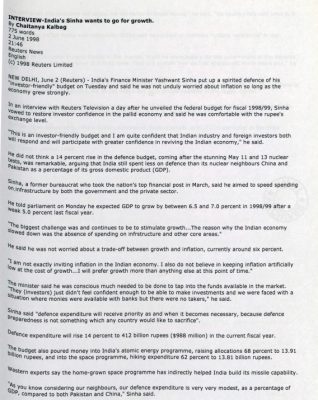Interview- India’s Sinha wants to go for growth
[Reuters]
Published date: 2nd June 1998
2 June 1998
Reuters News
English
(c) 1998 Reuters Limited
NEW DELHI, June 2 (Reuters) – India’s Finance Minister Yashwant Sinha put up a spirited defence of his Investor-friendly” budget on Tuesday and said he was not unduly worried about inflation so long as the economy grew strongly.
In an interview with Reuters Television a day after he unveiled the federal budget for fiscal 1998/99, Sinha vowed to restore Investor confidence in the pallid economy and said he was comfortable with the rupee’s exchange level.
“This is an investor-friendly budget and I am quite confident that Indian industry and foreign investors both will respond and will participate with greater confidence in reviving the Indian economy,” he said.
He did not think a 14 percent rise in the defence budget, coming after the stunning May 11 and 13 nuclear tests, was remarkable, arguing that India still spent less on defence than Its nuclear neighbours China and Pakistan as a percentage of its gross domestic product (GDP).
Sinha, a former bureaucrat who took the nation’s top financial post in March, said he aimed to speed spending on. Infrastructure by both the government and the private sector.
He told parliament on Monday he expected GDP to grow by between 6.5 and 7.0 percent in 1998/99 after a weak 5.0 percent last fiscal year.
The biggest challenge was and continues to be to stimulate growth … The reason why the Indian economy slowed down was the absence of spending on infrstructure and other core areas.”
He said he was not worried about a trade-off between growth and inflation, currently around six percent. I am not exactly inviting inflation in the Indian economy. I also do not believe in keeping inflation artificially low at the cost of growth … I will prefer growth more than anything else at this point of time.”
The minister said he was conscious much needed to be done to tap into the funds available In the market. They (investors) just didn’t feel confident enough to be able to make investments and we were faced with a situation where monies were available with banks but there were no takers,” he said.
Sinha said “defence expenditure will receive priority as and when it becomes necessary, because defence preparedness is not something which any country would like to sacrifice”.
Defence expenditure will rise 14 percent to 412 billion rupees ($988 million) In the current fiscal year. The budget also poured money into India’s atomic energy programme, raising allocations 68 percent to 13.91 billion rupees, and into the space programme, hiking expenditure 62 percent to 13.81 billion rupees.
Western experts say the home-grown space programme has indirectly helped India build its missile capability.
As you know considering our neighbours, our defence expenditure is very very modest, as a percentage of GDP, compared to both Pakistan and China,” Sinha said.
Sinha’s budget speech on Monday made no mention of the economic sanctions slapped on India by the United States and other countries after the nuclear tests.
“I do not buy the argument that we had to do something dramatic immediately in order to show the impact of sanctions on the budget,” Sinha told Reuters.
He said details of U.S. sanctions were still not clear, and other nations had halted aid flows that usually took 12 to 18 months to get through the pipeline.
“As and when the sanctions will come, we will factor in those inputs,” he said. “No country has said what is in the pipeline, what is approved, is going to be stopped.”
AS far as the Indian rupee was concerned, Sinha said he wanted to maintain “orderly conditions” in the market.
As long as the rupee is being traded in the market, It will be unnecessary for the government or the Reserve Bank of India to peg the rupee at a fixed level. That is a system that we had abandoned many years ago,” he said.
“If there is any volatility, if there are disorderly conditions, then that is the time when RBI, I think, will have to intervene. But for the moment, we do not notice any such undue volatility in the rupee market.”
India’s markets have reacted with disappointment to Sinha’s budget, interpreting it as protectionist and not geared enough for growth. The Bombay share index fell 1.91 percent to 3,573.21 on Tuesday.
But the rupee appeared to reflect Sinha’s confidence, holding steady at 41.77/78 per dollar at the close against Monday’s 41.71/73.






